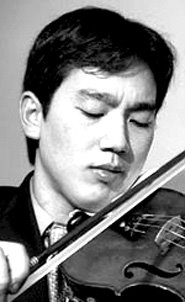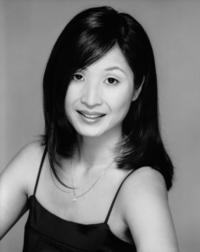 Presenting the Naumburg Competition winner Frank Huang at the Kennedy Center’s Terrace Theater this Wednesday, the Washington Performing Arts Society continued the laudable tradition of presenting local audiences with the most promising up-and-coming talent in classical music. The intention remains a good one, worthy of support – and for what followed in the concert, WPAS is not to be blamed. The 26-year old Huang presented a program that focused on the virtuosic aspects of violin playing while at the same time striking a good balance between ear-candy and substantive fare where his musical partner Carol Wong could have brought her commendable skills to the table, too. Opening with Tartini’s Devil’s Trill Sonata and closing with the Paganini Campanella, he placed Prokofiev’s first and Ravel’s only violin sonatas inbetween – aided and abetted by the Saint-Saëns Rondo and Introduction Capriccioso. Skillfully performed, such a program can thrill anyone who goes for the sheer show of it but also delight the more prudish music lover who prefers ‘serious’ fare. I cannot say that it did neither, because the audience erupted in frivolously frenetic applause afterwards, but there were reservations to be had.
Presenting the Naumburg Competition winner Frank Huang at the Kennedy Center’s Terrace Theater this Wednesday, the Washington Performing Arts Society continued the laudable tradition of presenting local audiences with the most promising up-and-coming talent in classical music. The intention remains a good one, worthy of support – and for what followed in the concert, WPAS is not to be blamed. The 26-year old Huang presented a program that focused on the virtuosic aspects of violin playing while at the same time striking a good balance between ear-candy and substantive fare where his musical partner Carol Wong could have brought her commendable skills to the table, too. Opening with Tartini’s Devil’s Trill Sonata and closing with the Paganini Campanella, he placed Prokofiev’s first and Ravel’s only violin sonatas inbetween – aided and abetted by the Saint-Saëns Rondo and Introduction Capriccioso. Skillfully performed, such a program can thrill anyone who goes for the sheer show of it but also delight the more prudish music lover who prefers ‘serious’ fare. I cannot say that it did neither, because the audience erupted in frivolously frenetic applause afterwards, but there were reservations to be had.Among the violinist’s show-off works, Tartini’s Beelzebub-possessed sonata is one of the more musical and pleasing ones. The opening slow movement (Larghetto affetuoso) particularly so. Despite or because its lesser or less obvious demands on the performer’s technical über-skills, it came off best under Mr. Huang’s hands. A very unique tone of medium size is his own – warm but not fuzzy, caramel in texture but not quite sweet. I don’t know what instrument he currently plays but would not be surprised to find out if it were of the Stradivarius family. The rest of the Tartini, the Allegro and Grave; Allegro assai, was impressive but not much more. The following Prokofiev started well… meditative in the Andante assai and then storming into the Allegro brusco. The last movement, Allegrissimo, was the primus inter pares. If no complaints can be made about any single aspect of its execution, neither did it catch fire at any given point.
 The Ravel Allegretto opening movement, where the violin lines never sang or soared but always sounded pushed, gave rise to questions as to whether another work might have made for better programming alongside the Prokofiev. The generally fun Blues: Moderato movement, however, hinted at the fact that Ravel was not the one to blame. Although fine effects of tone production were used by Mr. Huang I’ve never heard the movement as leaden as here – a charge of which violinist and pianist were equally guilty; trudging through the music with exceptional joylessness. The two proceeded to work through the Perpetuum mobile finale, which sounded like effort made-audible.
The Ravel Allegretto opening movement, where the violin lines never sang or soared but always sounded pushed, gave rise to questions as to whether another work might have made for better programming alongside the Prokofiev. The generally fun Blues: Moderato movement, however, hinted at the fact that Ravel was not the one to blame. Although fine effects of tone production were used by Mr. Huang I’ve never heard the movement as leaden as here – a charge of which violinist and pianist were equally guilty; trudging through the music with exceptional joylessness. The two proceeded to work through the Perpetuum mobile finale, which sounded like effort made-audible.Saint-Saëns to the rescue one should think: the ever so popular op. 28 is entertaining pretty much every time someone can actually pull off its technical demands with aplomb. The sure-fingeredness and accuracy of virtuoso Huang were there every step of the way. In the distance and with a bit of optimistic imagination you could hear how he is likely able to make the violin do his every bidding. But both artists must have had an off day because to get the notes so right at any chosen speed and still make the Introduction and Rondo sound so anemic can only be the result of some unfortunate confluence of indisposition. I know that that is not how either artist has won their numerous and prestigious awards and popular acclaim.
Andrew Lindemann Malone, Frank Huang (Washington Post, December 2) |
About two years ago Peter G. Davis wrote in New York Magazine that Huang played “without leaving a note to chance.” Meant as high praise, this statement – true enough – also embodies the problem with the recital at the Terrace Theater. Sometimes, chances have to be taken for the music to leave the pages and come to life. Given his impeccable facilities, it is reasonable to assume that Frank Huang will mature further in his playing and bring aspects to it that were left wanting this Wednesday.